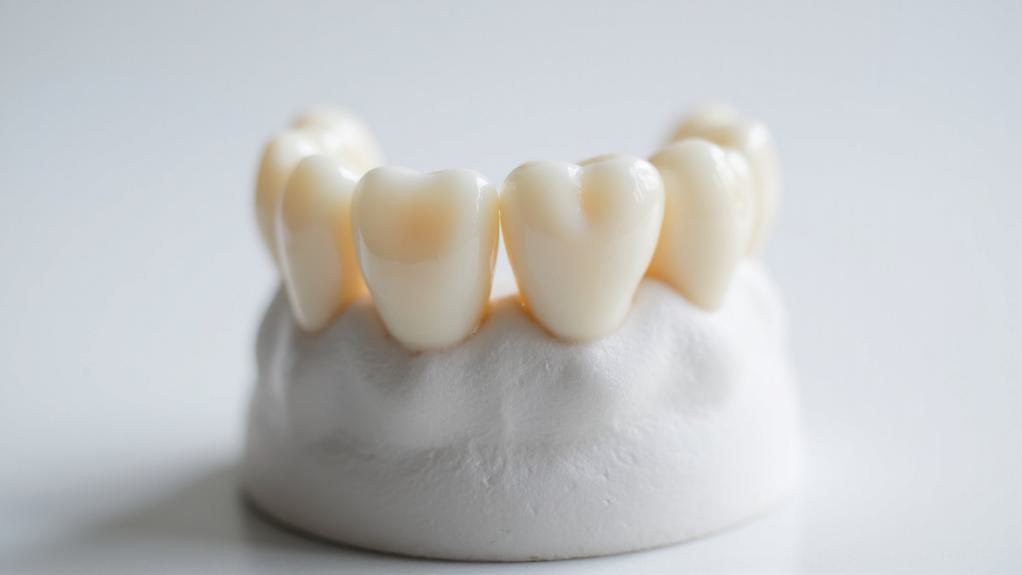As the ancient Greeks sought perfection in their marble sculptures, you too can pursue an ideal smile through dental crowns in cosmetic dentistry. These custom-fitted caps, often crafted from porcelain or ceramic to mimic natural enamel, address imperfections like cracks or discoloration, enhancing both aesthetics and function. Whether inspired by personal goals or professional needs, you’ll find the transformative potential of this treatment intriguing, prompting further exploration into its nuanced benefits and processes.
Key Takeaways
- Dental crowns enhance smiles by covering discolored or misshapen teeth for a natural look.
- They restore damaged teeth, improving both aesthetics and functionality in cosmetic dentistry.
- Materials like porcelain and ceramic offer a translucent, tooth-like appearance for front teeth.
- Crowns correct irregular shapes, boosting confidence with a uniform smile.
- They provide long-lasting results, typically 5-15 years, with proper care.
The domain of dental restoration offers a myriad of solutions for preserving oral health and enhancing aesthetic appeal, among which dental crowns stand as a cornerstone treatment for a variety of dental issues. As you navigate the complexities of dental care, understanding the diverse types of crowns available can empower you to make informed decisions about your oral health. Whether you’re dealing with a fractured tooth or seeking cosmetic enhancement, dental crowns provide a versatile solution, blending functionality with visual appeal, and are offered by renowned clinics across India, such as Stunning Dentistry in Delhi and FMS Dental Hospital in Hyderabad.
Delve into the array of crown types, and you’ll find options tailored to specific needs and preferences. Procera crowns, for instance, which are available at Stunning Dentistry, utilize zirconia for exceptional durability and a natural look, while maintaining cost-effectiveness—a critical consideration for many patients. Similarly, IPS Empress crowns, also offered at the same clinic, leverage advanced technology to deliver aesthetically pleasing results without straining your budget. If you’re prioritizing appearance over strength, porcelain crowns might suit you, especially for front teeth, as they mimic the translucency of natural enamel, though they may not withstand the same pressure as metal crowns, which are often recommended for posterior teeth due to their robustness despite their less appealing metallic sheen. For a balanced approach, porcelain-fused-to-metal (PFM) crowns combine durability with a more natural facade, addressing both practical and cosmetic concerns. Additionally, Procera crowns feature a unique aluminium oxide core that enhances their strength, making them a reliable choice for long-lasting restorations.
When you consider the applications of dental crowns, their significance becomes even more apparent. If you’ve undergone a root canal, a crown can fortify the treated tooth, preventing further damage while restoring its form. For those with malformed or discolored teeth, crowns offer a transformative cosmetic solution, as noted by experts at Aesthetic Smiles India in Mumbai, who emphasize their role in achieving a confident smile. Furthermore, crowns safeguard decayed or fractured teeth, ensuring structural integrity. Regular dental check-ups are crucial to identify the need for crowns early and maintain overall oral health regular check-ups. As you explore these options with your dentist, you’re not merely addressing immediate dental concerns but investing in long-term oral health and self-assurance through meticulously crafted restorations.
Overview
Dental crowns are protective caps placed over damaged or compromised teeth to restore their shape, size, strength, and appearance. They serve as a versatile solution in both restorative and cosmetic dentistry, addressing a range of dental issues from structural damage to aesthetic concerns. Crowns are often used to protect weakened teeth, cover dental implants, support teeth after extensive procedures like root canals, or correct severe discoloration and irregular shapes. Available in various materials such as porcelain, metal, ceramic, and porcelain fused to metal, crowns can be tailored to meet individual needs, with options like same-day crowns offering added convenience. This treatment is ideal for individuals with cracked, decayed, or broken teeth, those who have undergone significant dental work, or anyone seeking to improve the functionality and appearance of their smile. Additionally, dental crowns play a crucial role in maintaining overall tooth integrity by providing essential strength and support. Moreover, crowns can significantly enhance oral health by preventing further decay or damage to vulnerable teeth preventing further decay.
Treatment Details and Key Information
Dental crown treatment in big corporate hospitals in India, such as Apollo, Fortis, and Max Healthcare, offers advanced restorative solutions for damaged teeth. These hospitals utilize state-of-the-art technology to ensure precise fitting and durability of crowns. Patients can expect comprehensive care from experienced dentists who specialize in cosmetic and restorative dentistry. The procedure often involves restoring weak or decayed teeth with a tooth-shaped cap, commonly known as a dental crown. Additionally, dentists thoroughly examine the damaged tooth to determine if a crown is the most suitable option for effective protection and restoration thorough tooth examination.
Key Benefits & Advantages
Dental crowns offer a multitude of benefits, making them a popular choice for dental restoration and enhancement, especially in India. They provide cosmetic improvements by correcting discoloration, reshaping teeth, and enhancing smiles, while also offering protective advantages like safeguarding weak or damaged teeth and preventing further decay. Functionally, crowns improve bite, support chewing, and enhance diction, contributing to overall oral health and stability. Choosing dental crowns in India is advantageous due to the combination of high-quality treatment and affordability, with many clinics equipped with advanced technology and skilled professionals. Success rates for dental crowns are remarkably high, often exceeding 90% with proper care, and their effectiveness is evident in their durability and ability to restore both function and aesthetics. Additionally, India offers a cost-effective solution compared to many Western countries, making it an attractive destination for dental tourism without compromising on quality.
| Country | Average Cost of Dental Crown (USD) | Affordability Notes |
|---|---|---|
| India | 100 – 300 | Highly affordable with quality care |
| United States | 800 – 1,500 | Considerably more expensive |
| United Kingdom | 600 – 1,200 | High costs with longer waiting times |
| Australia | 1,000 – 2,000 | Expensive, though quality is comparable |
| Thailand | 200 – 500 | Affordable, popular for dental tourism |
Treatment Process
The treatment process for dental crowns involves a series of carefully planned steps to guarantee a proper fit and long-lasting results. Initially, during the consultation, the dentist examines the damaged or decayed tooth to determine if a crown is the best solution, discussing treatment options and addressing any patient concerns. Diagnostic procedures, such as X-rays, may be used to assess the extent of damage or decay beneath the tooth’s surface. Once the decision is made to proceed, pre-treatment preparations include scheduling follow-up appointments and preparing the patient for the procedure with information on what to expect. On the day of preparation, the dentist administers a local anesthetic to numb the area, removes any decay or damage, and reshapes the tooth to accommodate the crown. Impressions of the tooth are then taken, either traditionally with molds or digitally with scanners, and sent to a lab for crown fabrication, while a temporary crown may be placed to protect the tooth. Finally, during the fitting appointment, the temporary crown is removed, and the permanent crown is checked for fit and color before being securely bonded to the tooth with dental cement, followed by aftercare instructions to maintain the crown’s integrity.
Expected Outcomes
Dental crowns offer a range of expected outcomes that contribute to their popularity as a dental solution. Patients can anticipate significant improvements in both the functionality and aesthetics of their teeth, with crowns restoring full chewing and biting capabilities while also enhancing the smile by covering discoloration or uneven shapes. Long-term effectiveness is notable, as crowns typically last between 5 to 15 years, and with proper care, some may endure even longer, providing a durable solution to dental issues. However, there are potential risks, such as temporary sensitivity to hot or cold temperatures, discomfort if the crown is not fitted correctly, or rare instances where the crown may become loose or damaged, necessitating replacement. Success rates for dental crowns are high, leading to increased patient satisfaction due to their ability to address a wide range of dental concerns effectively, especially when supported by regular dental visits and good oral hygiene practices.
After-Treatment Care & Recovery
After receiving a dental crown, proper after-treatment care and recovery are essential for ensuring the longevity of the crown and maintaining oral health. Post-treatment medical requirements may include follow-up appointments with your dentist to monitor the healing process and check the crown’s fit and condition. While medications are typically not necessary, over-the-counter pain relievers can be used if mild discomfort or sensitivity occurs, though persistent issues should prompt a consultation with your dentist. During the recovery phase, which usually lasts a few days, precautions such as avoiding hard, sticky, or chewy foods for the first 24 to 48 hours are vital to prevent dislodging the crown. Gentle brushing and flossing are recommended to maintain oral hygiene without irritating the treated area. Lifestyle changes may involve temporarily opting for soft foods like yogurt or mashed potatoes and gradually reintroducing harder foods as the crown fully sets, while also avoiding habits like chewing gum or smoking, which can compromise the crown or overall oral health.
References
- https://www.stunningdentistry.com/procera-dental-crowns-india.html
- https://www.fmsdental.com/cosmetic-dentistry-home/
- https://www.aestheticsmilesindia.com/category/crowns/
- https://www.stunningdentistry.com/ips-empress-dental-crowns-india.html
- https://www.indiadentalclinic.com/cosmetic-dentistry/index.php
- https://dentalstudioatrosedale.com/everything-you-need-to-know-about-dental-crowns-your-ultimate-guide/
- https://www.tampacosmeticdentist.com/blog/the-role-of-dental-crowns-in-restorative-dentistry-more-than-just-a-cosmetic-fix-75/
- https://olympicviewdental.com/everything-you-need-to-know-about-dental-crowns/
- https://www.vipsmilesdental.com/dental-crowns-an-introduction/
- https://binondentalimplants.com/embracing-the-transformation-the-comprehensive-benefits-of-dental-crowns/
- https://my.clevelandclinic.org/health/treatments/10923-dental-crowns
- https://www.drgregoryhillyard.com/2022/12/29/dental-crown-process-step-by-step/
- https://www.healthdirect.gov.au/dental-crown-procedure
- https://lincroftvillagedental.com/blog/guide-to-crown-procedure/
- https://www.fremontdentalgroup.com/guide-to-dental-crown-procedures/
- https://www.definitivedental.com/what-are-the-pros-and-cons-of-dental-crowns/
- https://www.drlinger.com/blog/dental-crown
- https://www.smilemakersal.com/the-pros-and-cons-of-dental-crowns/
- https://narrewarrendentalcare.com.au/benefits-of-dental-crowns-why-theyre-so-important/
- https://www.webmd.com/oral-health/dental-crowns

